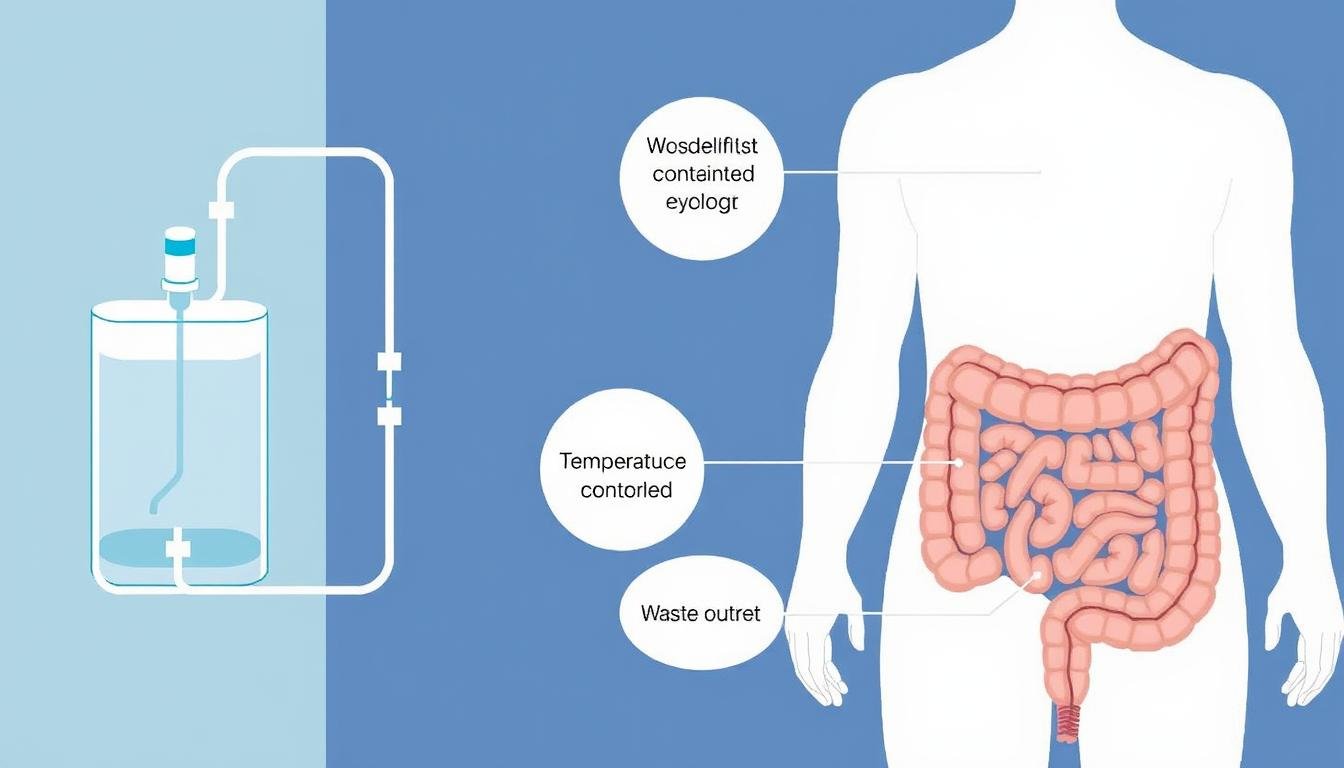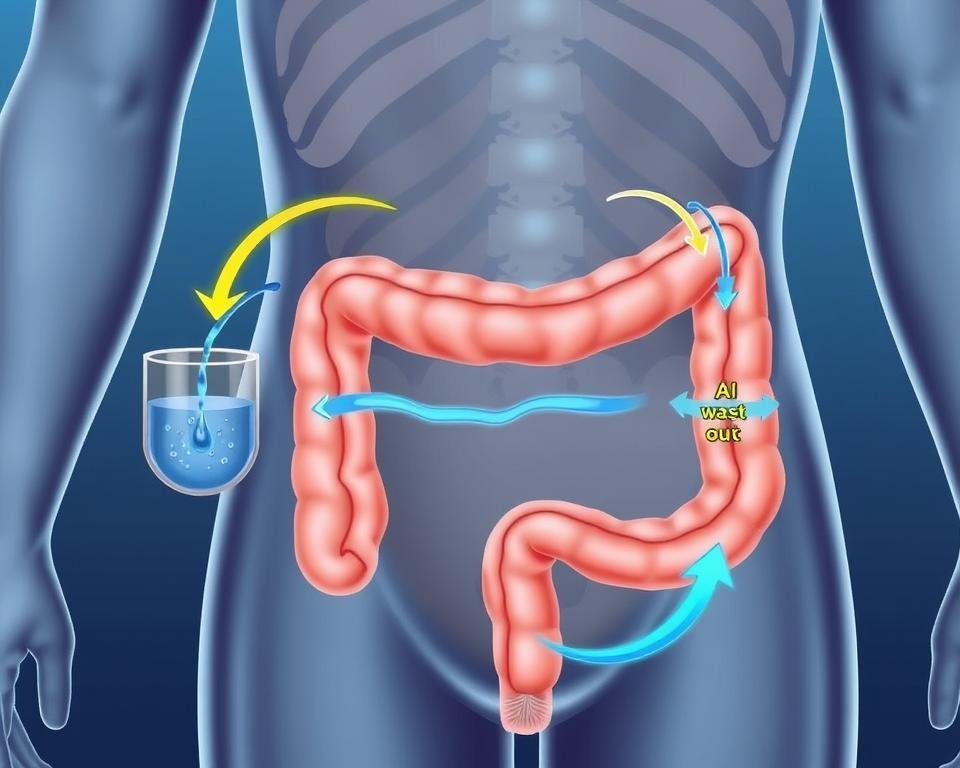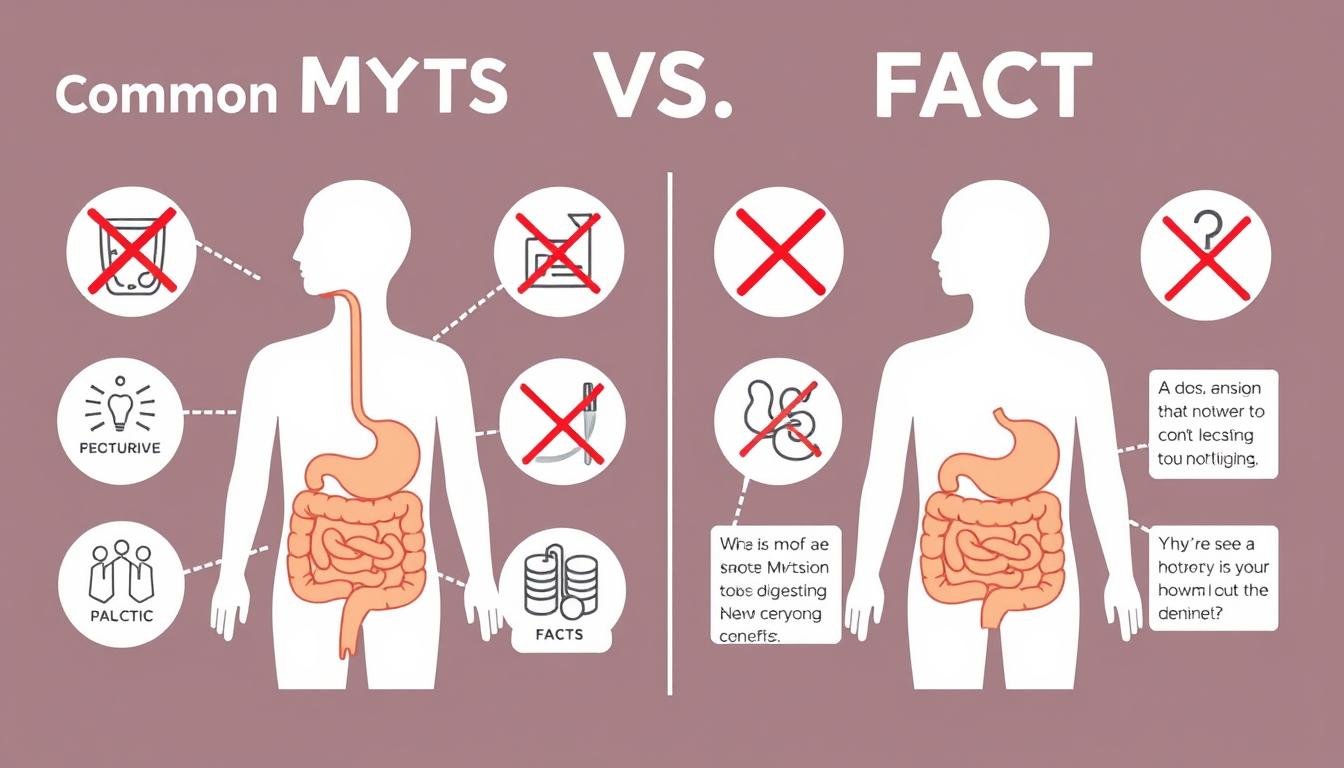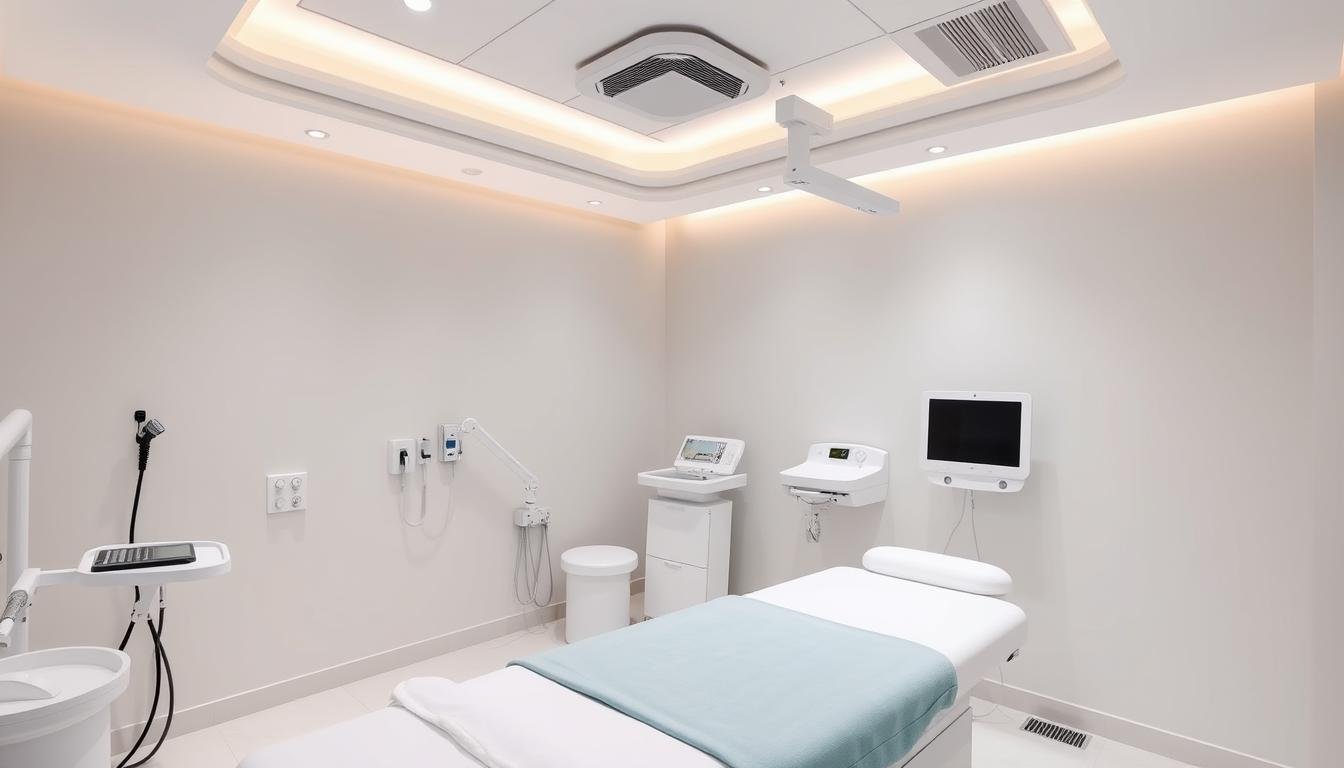Tagagawa ng Colon Hydrotherapy Device
Sa komprehensibong gabay na ito, lalakad ka namin sa buong proseso ng colonic, mula sa paghahanda hanggang sa pag -aalaga, na tinutulungan kang gumawa ng isang kaalamang desisyon tungkol sa paggamot sa kagalingan na ito.

Ano ang colon hydrotherapy?
Ang colon hydrotherapy, na tinatawag ding colonic irrigation o isang colonic, ay isang therapeutic na pamamaraan na idinisenyo upang linisin ang colon sa pamamagitan ng pagpapakilala ng mainit, na -filter na tubig sa tumbong. Ang prosesong ito ay tumutulong na alisin ang naipon na basura, mga lason, at gas mula sa malaking bituka, na potensyal na nagtataguyod ng mas mahusay na kalusugan ng pagtunaw.
Hindi tulad ng isang enema, na karaniwang naglilinis lamang ng mas mababang bahagi ng colon, ang isang propesyonal na colonic ay naglalayong linisin ang buong malaking bituka. Ang pamamaraan ay karaniwang isinasagawa ng isang sinanay na espesyalista na tinatawag na isang colonic hydrotherapist sa isang klinikal na setting.
Nagtataka kung tama ang colon hydrotherapy?
Ang mga isyu sa pagtunaw ay maaaring makabuluhang makakaapekto sa iyong kalidad ng buhay. Makipag -usap sa isang kwalipikadong practitioner upang malaman kung ang colon hydrotherapy ay maaaring makatulong na matugunan ang iyong mga tiyak na alalahanin.
Paano gumagana ang isang colonic?
Ang pag -unawa sa mga mekanika ng kung paano ang isang colonic na gumagana ay makakatulong na mapagaan ang anumang pag -aalala tungkol sa pamamaraan. Ang proseso ay nagsasangkot ng ilang mga pangunahing sangkap na nagtutulungan upang ligtas na linisin ang colon.
Ang mga kagamitan sa colonic

Ang mga modernong kagamitan sa colonic ay karaniwang nagtatampok ng isang saradong sistema na may maraming mahahalagang sangkap:
- Isang dalubhasang kama o talahanayan kung saan ka magsisinungaling nang kumportable sa panahon ng pamamaraan
- Isang suplay ng tubig na kinokontrol ng temperatura na nagpapanatili ng tubig sa isang ligtas, komportableng temperatura
- Pagtatapon, sterile tubing para sa paghahatid ng tubig at pag -alis ng basura
- Mga kontrol sa presyon upang matiyak ang malumanay na daloy ng tubig
- Isang tubo ng pagtingin (sa ilang mga system) na nagpapahintulot sa therapist na subaybayan ang basura na tinanggal
Ang hakbang-hakbang na pamamaraan
Narito kung paano gumagana ang isang tipikal na sesyon ng colonic:
- Paunang pagtatasa: Bago magsimula, susuriin ng hydrotherapist ang iyong kasaysayan ng kalusugan at talakayin ang iyong mga layunin para sa paggamot.
- Paghahanda: Hihilingin kang magbago sa isang gown at maayos na mai -drap para sa privacy. Iiwan ng therapist ang silid habang pinoposisyon mo ang iyong sarili nang kumportable sa mesa.
- Insertion: Ang therapist ay malumanay na magpasok ng isang maliit, hindi magagamit na speculum sa iyong tumbong. Ang speculum na ito ay konektado sa dalawang tubo - isa para sa malinis na paggamit ng tubig at isa para sa pag -aalis ng basura.
- Pagbubuhos ng tubig: Ang mainit, na -filter na tubig ay dahan -dahang ipinakilala sa colon. Ang temperatura at presyon ay maingat na kinokontrol para sa ginhawa at kaligtasan.
- Massage: Ang therapist ay maaaring mag -aplay ng magaan na massage ng tiyan upang makatulong na palayain ang nakulong na basura at gas.
- Pag -aalis ng basura: Habang pinupuno ng tubig ang colon, ang natural na peristalsis (kalamnan ng kalamnan) ay tumutulong na itulak ang mga loosened basurang materyal sa pamamagitan ng basurang tubo.
- Ulitin ang proseso: Ang proseso ng pagpuno at paglabas ay paulit-ulit na paulit-ulit sa loob ng 45-60 minuto na sesyon.
- Pagkumpleto: Kapag kumpleto ang session, tinanggal ang speculum, at bibigyan ka ng privacy upang magamit ang banyo kung kinakailangan.

Diagram: Paano dumadaloy ang tubig sa colon sa panahon ng hydrotherapy
Mga Kolonika kumpara sa mga enemas sa bahay: Pag-unawa sa mga pagkakaiba
Habang ang parehong mga kolonika at enemas ay nagsasangkot ng pagpapakilala ng tubig sa colon, may mga makabuluhang pagkakaiba sa pagitan ng mga pamamaraang ito:
| Tampok | Propesyonal na colonic | Sa bahay na enema |
| Nilinis ang lugar | Buong colon (humigit -kumulang 5 talampakan) | Mas mababang bahagi ng colon lamang |
| Dami ng tubig | Maramihang mga galon sa buong session | Karaniwan ang 1-2 quarts |
| Tagal | 45-60 minuto | 5-15 minuto |
| Uri ng system | Saradong System (Paglabas ng Basura Sa pamamagitan ng Tube) | Open System (basura na pinalayas sa banyo) |
| Propesyonal na Oversight | Isinagawa ng sinanay na espesyalista | Pinangangasiwaan ng sarili |
| Kagamitan | Propesyonal-grade na may mga kontrol sa temperatura at presyon | Pangunahing kit na may limitadong mga kontrol |
Habang ang mga enemas sa bahay ay maaaring magbigay ng pansamantalang kaluwagan para sa tibi, hindi nila inaalok ang komprehensibong paglilinis na maibibigay ng isang propesyonal na colonic. Bilang karagdagan, ang hindi tamang pangangasiwa ng mga enemas sa bahay ay maaaring humantong sa mga komplikasyon.
Mga potensyal na benepisyo ng colon hydrotherapy

Ang mga proponents ng colon hydrotherapy ay nagmumungkahi ng maraming mga potensyal na benepisyo, kahit na mahalaga na tandaan na ang pang -agham na pananaliksik sa mga benepisyo na ito ay limitado. Ang ilang mga karaniwang naiulat na benepisyo ay kinabibilangan ng:
Mga benepisyo sa pagtunaw
- Kaluwagan mula sa tibi at hindi regular na paggalaw ng bituka
- Pagbawas sa Bloating at Gas
- Potensyal na pagpapabuti sa mga sintomas ng magagalitang bituka syndrome (IBS)
- Pinahusay na pag -andar ng pagtunaw
Mga benepisyo sa pangkalahatang kagalingan
- Nadagdagan ang enerhiya at sigla
- Pinahusay na kalinawan ng kaisipan
- Suporta para sa mga proseso ng detoxification
- Potensyal na pagpapabuti sa mga kondisyon ng balat
Tala ng Pananaliksik: Isang maliit na pag -aaral ng piloto na nai -publish noong 2016 sa journal Mga pamamaraan sa coloproctology natagpuan na ang ilang mga kalahok na may magagalitang bituka sindrom ay nag -ulat ng pagpapabuti sa mga sintomas pagkatapos ng colonic irigasyon. Gayunpaman, ang pag -aaral ay limitado sa pamamagitan ng maliit na sukat nito (18 mga kalahok) at kakulangan ng isang control group.
Mga panganib at pagsasaalang -alang

Habang maraming mga tao ang sumasailalim sa mga kolonik na walang mga komplikasyon, ang pamamaraan ay nagdadala ng ilang mga panganib na dapat na maingat na isaalang -alang:
Mga potensyal na panganib ng colon hydrotherapy
- Dehydration at Electrolyte Imbalance: Ang pamamaraan ay maaaring makagambala sa balanse ng likido at electrolyte ng katawan.
- Impeksyon: Kung ang kagamitan ay hindi maayos na isterilisado o kung ang bakterya mula sa tumbong ay ipinakilala sa colon.
- Bowel Perforation: Kahit na bihirang, ang presyon mula sa tubig ay maaaring makapinsala sa pader ng bituka.
- Pagkagambala ng gat microbiome: Ang mga kolonika ay maaaring hugasan ang mga kapaki -pakinabang na bakterya na sumusuporta sa kalusugan ng pagtunaw.
- Kawalan ng ginhawa: Ang ilang mga tao ay nakakaranas ng cramping, pagduduwal, o pagkahilo sa panahon o pagkatapos ng pamamaraan.
Sino ang dapat iwasan ang mga kolonik
Ang colon hydrotherapy ay hindi angkop para sa lahat. Dapat mong iwasan ang pamamaraang ito kung mayroon ka:
- Kamakailang operasyon sa tiyan
- Aktibong nagpapaalab na sakit sa bituka (Crohn's Disease, ulcerative colitis)
- Diverticulitis
- Hemorrhoids o rectal/anal fissure
- Sakit sa bato
- Sakit sa puso
- Malubhang almuranas
- Pagbubuntis
“May kaunting katibayan na ang paglilinis ng colon ay gumagawa ng mga epektong ito o kapaki -pakinabang sa lahat. Sa katunayan, ang paglilinis ng colonic ay maaaring mapanganib.”
Nag -aalala tungkol sa kalusugan ng pagtunaw?
Bago subukan ang colon hydrotherapy, kumunsulta sa isang tagapagbigay ng pangangalagang pangkalusugan upang talakayin kung naaangkop ito para sa iyong tiyak na sitwasyon sa kalusugan.
Ano ang aasahan: Bago, habang, at pagkatapos
Bago ang iyong colonic

Ang wastong paghahanda ay makakatulong upang matiyak ang isang mas epektibo at komportable na karanasan sa colonic:
- Hydration: Uminom ng maraming tubig sa mga araw na humahantong sa iyong appointment.
- Diet: Iwasan ang mabibigat, naproseso na mga pagkain sa loob ng 24-48 na oras bago ang iyong session. Tumutok sa mas magaan na pagkain at gulay.
- Timing: Huwag kumain ng isang malaking pagkain sa loob ng 2 oras ng iyong appointment.
- Kasaysayan ng Medikal: Maging handa upang talakayin ang iyong kasaysayan ng kalusugan at anumang mga alalahanin sa pagtunaw sa iyong therapist.
Sa panahon ng iyong colonic
Ang pag -unawa sa kung ano ang mangyayari sa panahon ng pamamaraan ay makakatulong na mapagaan ang pagkabalisa:
- Tagal: Ang isang karaniwang session ay tumatagal ng 45-60 minuto.
- Pagkapribado: Maayos kang mag -drap para sa kahinhinan sa buong pamamaraan.
- Mga Sensasyon: Maaari kang makaramdam ng isang banayad na kapunuan habang ang tubig ay pumapasok sa colon at banayad na kaluwagan habang tinanggal ang basura.
- Komunikasyon: Ang iyong therapist ay dapat suriin nang regular tungkol sa iyong antas ng ginhawa.
Pagkatapos ng iyong colonic

Mahalaga ang pangangalaga sa post-procedure para sa pag-maximize ng mga benepisyo at pagliit ng anumang mga potensyal na epekto:
- Hydration: Uminom ng maraming tubig upang magdagdag ng mga likido.
- Probiotics: Isaalang -alang ang pagkuha ng isang probiotic supplement upang makatulong na maibalik ang mga kapaki -pakinabang na bakterya ng gat.
- Pahinga: Ang ilang mga tao ay nakakaramdam ng lakas pagkatapos ng isang colonic, habang ang iba ay maaaring makaramdam ng pagod. Makinig sa iyong katawan.
- Diet: Kumain ng ilaw, madaling natutunaw na mga pagkain para sa susunod na 24 na oras.
- Mga Pagbabago sa Banyo: Maaari mong mapansin ang mga pagbabago sa iyong mga paggalaw ng bituka para sa susunod na ilang araw habang ang iyong sistema ay muling balanse.
Karaniwang mga alamat tungkol sa mga kolonik

Pabula: Maaaring pagalingin ng mga kolonik ang malubhang sakit
Katotohanan: Habang ang ilang mga proponents ay nag -aangkin ng mga kolonika ay maaaring gamutin o pagalingin ang mga malubhang kondisyon tulad ng cancer o mga sakit na autoimmune, walang ebidensya na pang -agham na sumusuporta sa mga habol na ito. Ang mga kolonika ay dapat tiningnan bilang isang pantulong na kasanayan sa kagalingan, hindi isang medikal na paggamot para sa mga malubhang kondisyon.
Pabula: Lahat ay may pounds ng nakakalason na basura na binuo sa kanilang colon
Katotohanan: Ang malusog na colon ay hindi napuno “nakakalason na basura” Iyon ay naipon ng maraming taon. Ang mga natural na proseso ng pag -aalis ng katawan ay patuloy na gumagana upang alisin ang basura. Habang ang tibi ay maaaring maging sanhi ng pansamantalang pag-backup, ang ideya ng pang-matagalang pag-iipon ng basura ay karaniwang pinalaki.
Pabula: Ang mga kolonik ay kinakailangan para sa detoxification
Katotohanan: Ang katawan ay may sariling sopistikadong mga sistema ng detoxification, lalo na ang atay at bato. Habang ang mga kolonika ay maaaring makatulong sa pansamantalang kaluwagan ng tibi, hindi sila kinakailangan para sa katawan na matanggal nang epektibo ang mga lason.
Pabula: Ang mga kolonika ay ganap na walang panganib
Katotohanan: Tulad ng tinalakay sa seksyon ng mga peligro, ang mga kolonika ay nagdadala ng mga potensyal na panganib kabilang ang pag -aalis ng tubig, kawalan ng timbang ng electrolyte, at sa mga bihirang kaso, pagbubunot ng bituka. Hindi sila angkop para sa lahat, lalo na sa ilang mga kondisyong medikal.
Madalas na nagtanong tungkol sa mga kolonika
Nasasaktan ba ang isang colon?
Karamihan sa mga tao ay nakakahanap ng mga kolonika na hindi komportable ngunit hindi masakit. Maaari kang makaranas ng mga damdamin ng kapunuan, presyon, o banayad na cramping habang ang tubig ay pumapasok sa colon at basura ay pinakawalan. Ang isang bihasang practitioner ay gagana upang matiyak ang iyong kaginhawaan sa buong pamamaraan.
Gaano katagal ang isang colonic?
Ang isang tipikal na sesyon ng colonic ay tumatagal sa pagitan ng 45 minuto hanggang isang oras. Kasama dito ang paunang paghahanda, ang aktwal na pamamaraan, at isang maikling panahon ng pahinga pagkatapos.
Ilan ang mga kolonika na dapat kong magkaroon?
Nag -iiba ito depende sa mga indibidwal na layunin at kundisyon sa kalusugan. Inirerekomenda ng ilang mga practitioner ang isang serye ng 3-6 na sesyon na lumipas sa loob ng maraming linggo para sa paunang paglilinis, na sinusundan ng mga sesyon ng pagpapanatili kung kinakailangan. Laging kumunsulta sa isang tagapagbigay ng pangangalagang pangkalusugan bago simulan ang anumang regimen sa paggamot.
Mawawalan ba ako ng timbang mula sa isang colonic?
Maaari kang makaranas ng pansamantalang pagbaba ng timbang dahil sa pag -alis ng basurang materyal at tubig. Gayunpaman, ang mga kolonika ay hindi isang solusyon sa pagbaba ng timbang, at ang anumang timbang na nawala ay karaniwang nabawi habang kumakain ka at uminom nang normal.
Nakakahiya ba ang isang colonic?
Ang mga propesyonal na colonic hydrotherapist ay sinanay upang mapanatili ang iyong dignidad at ginhawa. Maayos kang mag -drap sa buong pamamaraan, at ang mga saradong kagamitan ng system ay nagpapaliit ng amoy at gulo. Karamihan sa mga kliyente ay nakakahanap ng karanasan na hindi gaanong nakakahiya kaysa sa inaasahan nila.

Paghahanap ng isang kwalipikadong colon hydrotherapist
Kung isinasaalang -alang mo ang colon hydrotherapy, mahalaga na makahanap ng isang kwalipikado, may karanasan na practitioner:
- Sertipikasyon: Maghanap ng mga therapist na sertipikado ng mga kinikilalang mga organisasyon tulad ng International Association for Colon Hydrotherapy (I-ACT) o ang Global Professional Association for Colon Therapy (GPACT).
- Pasilidad: Ang klinika ay dapat na malinis, propesyonal, at gumamit ng kagamitan na nakarehistro sa FDA.
- Karanasan: Magtanong tungkol sa pagsasanay ng therapist at kung gaano katagal sila ay nagsasanay.
- Mga Review: Suriin ang mga online na pagsusuri at humingi ng mga sanggunian mula sa mga nakaraang kliyente.
- Konsulta: Ang isang mahusay na therapist ay mag -aalok ng isang konsultasyon bago ang iyong unang paggamot upang talakayin ang iyong kasaysayan ng kalusugan at sagutin ang mga katanungan.
Handa nang malaman ang higit pa tungkol sa colon hydrotherapy?
Kung isinasaalang -alang mo ang paggamot na ito, ang susunod na hakbang ay ang pakikipag -usap sa isang kwalipikadong propesyonal na maaaring matugunan ang iyong mga tukoy na alalahanin at layunin sa kalusugan.
Maghanap ng isang sertipikadong practitioner na malapit sa iyo
Konklusyon: Tama ba sa iyo ang colon hydrotherapy?
Nag -aalok ang Colon Hydrotherapy ng isang natatanging diskarte sa digestive wellness na ang ilang mga tao ay nakakakita ng kapaki -pakinabang. Habang ang ebidensya na pang -agham para sa marami sa mga inaangkin na benepisyo nito ay limitado, maraming mga indibidwal ang nag -uulat ng mga positibong karanasan sa pamamaraan.
Tulad ng anumang kasanayan sa kagalingan, mahalaga na lapitan ang colon hydrotherapy na may makatotohanang mga inaasahan at isang pag -unawa sa parehong mga potensyal na benepisyo at panganib. Ano ang gumagana nang maayos para sa isang tao ay maaaring hindi angkop para sa isa pa.
Bago subukan ang colon hydrotherapy, kumunsulta sa iyong tagapagbigay ng pangangalagang pangkalusugan, lalo na kung mayroon kang mga kondisyon sa kalusugan. Ang isang kwalipikadong medikal na propesyonal ay maaaring makatulong sa iyo na matukoy kung ang pamamaraang ito ay nakahanay sa iyong pangkalahatang mga layunin at pangangailangan sa kalusugan.
Alalahanin na ang colon hydrotherapy ay dapat na umakma, hindi palitan, malusog na mga kasanayan sa pamumuhay tulad ng tamang nutrisyon, regular na ehersisyo, sapat na hydration, at pamamahala ng stress - na lahat ay nag -aambag nang malaki sa pagtunaw at pangkalahatang kalusugan.
